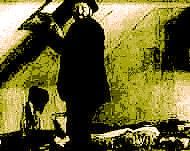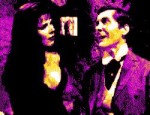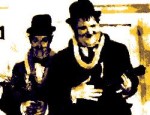Film Review

The film carries off where the previous film in the series (Juve contre Fantômas ) ended. Inspector Juve has disappeared, as, apparently has Fantômas. Rather than resolve the loose ends left dangling at the end of the previous film, this one immediately launches into a bizarre murder mystery which seemingly has no relation to it. Whilst this is frustrating - Feuillade knows perfectly well that is audience are constantly wondering what has happened to Juve and Fantômas - the story is so intriguing and well crafted that it quickly takes over our attention. It is very rare that you come across a film of this level of plot sophistication from the pre-WWI era.
Although it is the longest of Feuillade's Fantômas films, its use of suspense and the ingenuity of the plot makes it feel like it is the shortest. The acting is superlative, and the cagoule-wearing Fantômas is by now a truly frightening creation, capable of anything, with a band of silent black-clad henchmen to spread his terror. By anyone's standards, this is an extraordinary and memorable film, the stuff of both legends and nightmares.
© James Travers 2001
The above content is owned by frenchfilms.org and must not be copied.
Film Synopsis
The journalist Fandor is left to lament the death of his courageous friend and ally Inspector Juve after the latter perished in an explosion in the course of their most recent dramatic tussle with the evil master of crime Fantômas. Fandor is grateful for the distraction afforded by another mysterious case - the seemingly inexplicable death of a ceramics artist named Jacques Dollon. The latter was confined to a Paris police cell, after being arrested for killing one of his customers, when he met his death, strangled by an unknown assailant. The hallmarks of the crime are all too familiar for the journalist who has begun to see the menacing shadow of Fantômas everywhere he turns.But more bizarre twists are to follow. First Dollon disappears from his cell and then, not long afterwards, his fingerprints are found on the neck of Princess Danidoff after she has been divested of a valuable pearl necklace. Is it possible that a dead man can come to life and embark on a career of crime? This is the impression that Fantômas intends to create with his most fantastic criminal exploit yet. With skin taken from the hands of the dead ceramist he has created a special pair of gloves which will allow him to leave Dollon's fingerprints instead of his own at the scene of every crime he visits. If only Juve were still alive, Fandor might have a chance to resolve the mystery and thwart his archenemy's latest diabolical scheme. But is the Inspector as dead as he appears...?
© James Travers
The above content is owned by frenchfilms.org and must not be copied.
Similar Films
Here are some other films you may enjoy watching:- Le Parfum de la dame en noir (1931)
- The October Man (1947)
- Les Femmes s'en balancent (1954)
- Méfiez-vous fillettes (1957)
- Dr. Mabuse, der Spieler (1922)
Other related links:
Film Credits
- Director: Louis Feuillade
- Script: Louis Feuillade, Marcel Allain (novel), Pierre Souvestre (novel)
- Cinematographer: Georges Guérin, Albert Sorgius
- Cast: René Navarre (Fantômas), Georges Melchior (Jérôme Fandor), Luitz-Morat (Thomery), André Luguet (Jacques Dollon), Naudier (Le gardien Nibet), Renée Carl (Lady Beltham), Fabienne Fabrèges (Elisabeth Dollon), Jane Faber (La princesse Danidoff), Edmond Bréon (Inspector Juve), Yvette Andréyor (Joséphine)
- Country: France
- Language: French
- Support: Black and White / Silent
- Runtime: 90 min
- Aka: The Dead Man Who Killed
The best of British film comedies

The very best American film comedies

The best French Films of the 1920s
